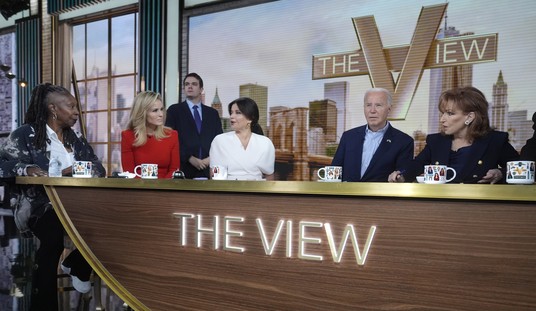Actually only the first three words of Ed Morrissey headline at The Week are really necessary when it comes to anything involving the pedantic Hollywood archleftist. As Ed writes, “The famed screenwriter is unhappy that news outlets are publishing emails leaked by hackers. But that’s what the media do:”
Sorkin, for his part, argued that the leaked material had no real news value, unlike the leaks from the Edward Snowden cache or the Pentagon Papers. Sony isn’t a government or Enron, he pointed out, but a movie studio, and nothing of what was stolen and published had any social or cultural value, appealing only to the prurient and the nosy.
In this, Sorkin landed a clean punch — but perhaps he was too much on target. His essay could easily be taken for an argument against the existence of Variety altogether. After all, Variety doesn’t cover governments or the Enrons of the world. What exactly is Variety supposed to cover, if not news about the studios and celebrities, the appetite for which can be best described as prurience and nosiness?
For that matter, the entertainment industry hardly rises to Sorkin’s stated standards, despite his best efforts. He fulminated about a NATO-type treaty among studios and unions to lobby Congress for some kind of action to defend against an attack on “one of America’s largest exports.” Sony Entertainment is a subsidiary of the Japanese corporation, of course, so it’s not exactly an American export. And if the American film industry as a whole is so important that it requires Congress to protect it, then suddenly we’re back to grounds that it is newsworthy, and that Variety and other media outlets are correct to exercise scrutiny whenever possible.
There is also a hint of double standards in Sorkin’s outrage. If the Rudin-Pascal email exchange had taken place at another corporation — say, Walmart or Koch Industries — would Sorkin have objected to a hack that exposed it, and media coverage about the exchange? Or would it have been just great journalism, as long as it didn’t gore Sorkin’s own ox?
Consider this: The IRS leaked confidential financial information about the National Organization for Marriage before the 2012 election, after which it ended up in the hands of its opponents, Human Rights Watch. It then got disseminated to media outlets, which published the data and damaged the conservative group’s operations during a political campaign. A similar leak struck the conservative Texas Public Policy Foundation, whose financial records also got published by a liberal outlet before the 2012 election.
On a public policy basis, as well as on the affront-to-American-values scale, those infractions should rank a little higher than the Sony hack. Yet Sorkin didn’t seem bothered by reporters following up on those leaks. Or perhaps I missed Sorkin’s call for Congress to take action against the IRS and its targeting of private conservative organizations.
Note that Sony’s op-ed ran in the New York Times, which published the Pentagon Papers during the Nixon era, but famously did everything it could to bury the Climategate scandal in November of 2009, as Alana Goodman wrote at Commentary:
Some may argue that it’s unfair to criticize [New York Times’ ‘environmental’ ‘reporter’ Andrew Revkin] for his private comments, and point out that none of these emails on its own could be characterized as an egregious ethical lapse. Maybe. But combined, they point to a pattern. There’s also this: Revkin was the same Times reporter who refused to publish the first trove of ClimateGate emails in 2009, claiming they were off-limits because they were “private” conversations (a standard the paper evidently hasn’t applied to other leaked documents). He also dismissed the scandal as meritless.
As one of the leading national environmental reporters, Revkin had a huge amount of influence over whether the ClimateGate controversy went anywhere. He ended up doing all he could to snuff it out. Should the fact that he wasn’t just involved in the emails, but also seemed to portray himself as an ideological ally to the scientists, raise ethical questions about the Times’ coverage of the first ClimateGate? I’d say so. And maybe Revkin’s departure from the news section one month after the emails leaked in 2009 means that, internally, the Times thought so as well.
As I wrote in November of 2009, Revkin’s motto back then seemed to be “All the News That’s Fit to Bury:”
Seeing as they each impact key pillars of what today passes for liberalism, there seems to be more than a few connections between the recent ACORN stings by Giles, O’Keefe and Breitbart, and the recent hacking of the emails of the University of East Anglia Climate Research Unit, or “Global WarmingGate”, as Charlie Martin dubs it elsewhere at Pajamas. Not the least is that they each sent the legacy media into full gatekeeper mode, hoping to prevent exciting, important news of current events from ever reaching their readers. Or perhaps, like the scandal last year involving John Edwards, sitting on the stories for so long, while making claims that they have to endlessly research them to verify their authenticity — Keep rockin’! — that when the legacy media decides to go “public” with news that everyone already knows, they can dramatically dilute the ultimate impact of these stories.
And then the Times went on to ask its readers to crowdsource any revelations in Sarah Palin’s emails, confirming its biases, and what news the admittedly leftwing paper deems fit to print.
Related: While Sony’s Amy Pascal, who previously banished Mel Gibson to industry Siberia for his drunken anti-Semitic rants rushes to Al Sharpton in an effort to save her job (see also: Imus, Don), don’t miss the New York Post on Scott Rudin, her co chair, “The man known as Hollywood’s biggest a-hole.” And that’s saying something, given the industry baseline.










Join the conversation as a VIP Member